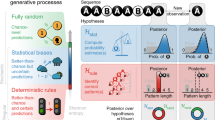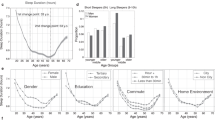Abstract
PERFORMANCE data reported in an earlier communication1 have been found to fit a short-term memory model suggested in the first instance by subjects' introspective reports. The experiment concerned used the “missing scan method”2, in which random series of letters drawn from the ensemble A to H were presented orally by tape recorder. Each letter occurred only once in each list, arid every list contained seven items, so that one letter of the ensemble was missing on each trial. Subjects were required to name this missing letter as quickly as possible.
This is a preview of subscription content, access via your institution
Access options
Subscribe to this journal
Receive 51 print issues and online access
$199.00 per year
only $3.90 per issue
Buy this article
- Purchase on Springer Link
- Instant access to full article PDF
Prices may be subject to local taxes which are calculated during checkout
Similar content being viewed by others
References
Berry, C., Nature, 207, 1012 (1965).
Buschke, H., Nature, 200, 1129 (1963).
Berry, C., Bull. Brit. Psychol. Soc., 18, No. 59, 13A (1965).
Miller, G. A., Galanter, E., and Pribram, K. H., in Plans and the Structure of Behaviour (Holt, New York, 1960).
Eysenck, H. J., Bull. Brit. Psychol. Soc., 19, 1 (1966).
Author information
Authors and Affiliations
Rights and permissions
About this article
Cite this article
BERRY, C. Individual Differences in Short-term Memory. Nature 220, 302–303 (1968). https://doi.org/10.1038/220302a0
Received:
Issue Date:
DOI: https://doi.org/10.1038/220302a0
Comments
By submitting a comment you agree to abide by our Terms and Community Guidelines. If you find something abusive or that does not comply with our terms or guidelines please flag it as inappropriate.



